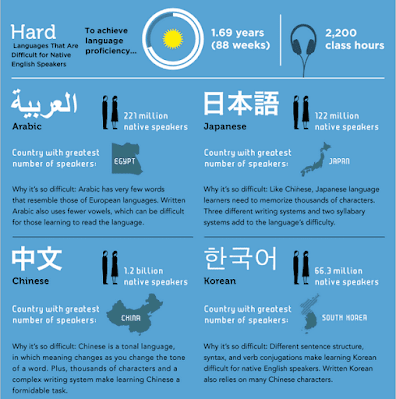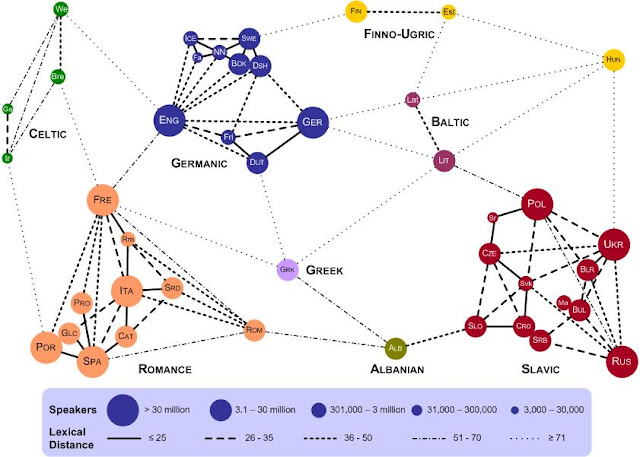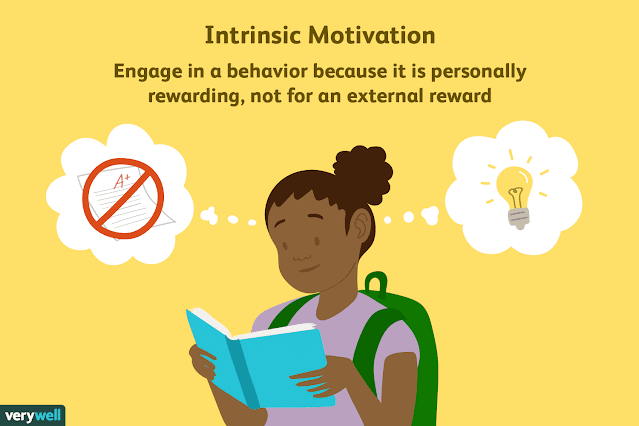A classic but very loaded question with almost infinite answers. At best we can only make an estimate based on specific parameters. We can take a look at the Foreign Service Institute (FSI) study which is based around class hours but still that is not very accurate to the individuals circumstances and doesn't state what their level was at by the end of the programme.
So what are the major factors in the time it takes to become proficient in a language:
- Time spent with the language
- Language distance
- Learner's motivation
- Resources available.
Let's take a deeper look at these factors and how you can use them to benefit you.
 |
| FSI estimates for English native speakers |
Time spent with the language
By far the biggest factor in learning a language is the amount of hours spent immersed in the language. Every minute you spend hearing the language or reading the script presents an opportunity for you to learn something new or strengthen your existing knowledge. You may have heard the 10,000 hours rule for skills and while in most cases it won't take that long to learn a language to be able to communicate in the language it's definitely a good number to keep in mind when you feel like progress isn't going your way.
The more hours we spend per day will have an exponential effect on our learning. Due to the shorter gaps in time between when we see words and structures we can actually learn quicker over time if we were to do 5 hours every day that if we did 10 hours every other day. Although perhaps the brain works like muscle and benefits from the days rest, if anyone finds a study on this please let me know.
So if we spend 5 hours a day we will improve at a much faster rate than someone doing 1 hour a week. The beauty of this factor is that it has nothing to do with the other factors, simply by putting in time we will become better quicker. For close languages at a rate of 5 hours a day we can expect some level of competency in around 2 years and for most distant languages probably closer to 5 years.
While it's actually impossible to finish learning a language as you will always have gaps in your knowledge regardless of how much time you spend, I mean we could all probably improve in our native language if we put our energy into specifically seeking out new words and expressions, when we get to this level spending time is no longer the answer but spending time wisely. While you will get to this point after many hours spent, you need to put in the hours to get to that point in the first place.
 |
| Man reading in park |
Distance from known languages
Language distance is a huge factor in the general time it takes to be comfortable with a language. If you want to learn a romance or germanic language as an english speaker it is going to take considerably less time, as stated in the previous section up to 2 years to reach a very comfortable level that you could even consider yourself fluent.
You can even test this if you would like to, if you take a look at any Spanish, Italian or even Swedish text you may be able to pick out a few words that are very similar to words we already know, with varying spelling. Alternatively a Chinese language native would have a much easier time learning Japanese, Korean, Vietnamese than would an romance language native.
This is more apparent the better you become at the language, when we start there are a bunch of 'native' words that exist only in that language even in very close languages such as Spanish and Italian. However as we get into the rarer words we start to see the commonality as the languages have thousands of words all borrowed from the same ancestor meaning you're just pronouncing or spelling the word that you already know just a little differently.
Another more overlooked reason for related languages is the culture tied to words. There are many words that exist in western languages that are simply untranslatable to eastern ones as the concepts are simply different. The people who invented these words were literally worlds apart and have a completely different view of the world. In Asia there is a concept known as ki/chi, that is an energy that exists within a person, it can be tainted from outside factors and even healed by various means. This concept simply does not exist in the west but we are aware of it due to it's popularisation from media and it's inability to be translated.
The distance of your known languages and target language can make the time frame of your journey increase by years. Depending on your motivations it may be better to learn a closely related language before taking on a more distant one just to prove to yourself you can accomplish this feat. Spending 3+ years of your time to learn a language does not feel good and is not motivating so requires a special drive to stay motivated.
 |
| Map of European language distance |
Learner's motivation and mindset
Not just staying motivated during your journey but your actual drive to learn the language in the first place. As English speakers it can be hard to understand the drive that someone could have to learn a language more useful than their own in almost every aspect in the modern world. In almost every situation if the learner has an unstoppable desire to learn a language they will do it quicker than someone who is doing it as a hobby or just for the sake of an extra skill cause they spare time.
Motivations are a big factor that affects the first two on this list. The more desire you have to achieve your language goal the more effort you will put into it, this means the more motivated learners will spend more time 10+ hours in some cases whereas the more halfhearted learners will be the ones who will put in 1 hour a week and feel content
Mindset can be a huge factor in motivation also. As with the example earlier of someone learning English, if you are a German guy who wants to spend the rest of his life working China and this is his dream, his goal, his one desire in life, then he is going to put his heart and soul into the process and do everything he can to make this goal happen. You will notice that the people with the loftier goals such as 'native like', are the people who are more likely to put the effort and time into learning.
Because these two mainly affect the time you will spend on the language and also your choice of language they can drastically change how long it will take you to learn, it might even take 5 years to get to a good level of a close language if you're just putting in 3 hours a week or it could even take you 2 or 3 years to get very comfortable in the most distant language if you have a burning desire and an impossible goal.
 |
| Having the right motivations will take you far |
Resources available
This one is more apparent once you try to learn a less common language and realise there just isn't any content full stop, never mind interesting content. Resources is quite a broad term is not just specific to learning materials such as grammar books and courses but encompasses the media of that language as a whole. This is what makes Japanese a common language for people to learn in the first place, they are often infatuated or well acquainted with content that is produced in that language.
On the other hand if you were to try to learn some African languages that have small amount of media, most likely just news broadcasts and interviews at best, it becomes much harder to get adequate content via the internet. Courses and grammar books are great for getting an introduction to the language so having these not available can make your introduction to the language a bit bumpier than the common languages that have multiple grammar guides and hundreds of free courses ran by native volunteers.
It's hard to tell exactly how much this would affect your ability to learn the language while being abroad, as you would be limited in the amount of content you could consume and possibly take longer to pick up the basics of the language. It might add years onto even simpler languages.
Luckily this is only a problem for rarer languages with less speakers, something like Estonia could be harder to learn than Finnish even though they are from the same family just due to one have less speakers and maybe even less willing learners, so the resources were not created to ease people in and the media is not there to keep them running.
For related posts please check out these pages:
- 5 Korean Movies Based on Real Life Events
- Nintendo Switch Games to play in Korean
- 7 Sources From Which to Learn 경상도 사투리
- Watching Media and Using Subtitles to Learn a Language
- How to Spend as Much of Your Day as Possible Learning Korean
- How to Type in Korean and How to Practice Typing Faster
- Smartphone Apps For Learning Korean
- Using Audio Description for Language Learning
- Should You Learn Korean?
- The Role of Anki in Language Learning
- How to Learn Korean in 2021
- I read 61 Korean books in 2020
- Can You Learn Korean from Kpop?

No comments:
Post a Comment
Share your thoughts on this topic